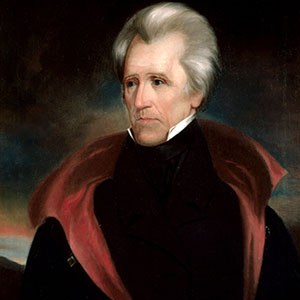Andrew Jackson was the seventh president of the United States from 1828-1836. He was known as a “war hero” for his success in the War of 1812, and the president for “all people” given his modest upbringing.
Early Life
Andrew Jackson was born on March 15, 1767 in the Waxhaws region bordering South Carolina. He grew up during the American Revolutionary War, in which he and his brothers were held hostage by the British. He was the first president to have been a prisoner of war due to his captivity at the age of 13. His mother and two brothers died in the war, thus further creating the hostility and resentment towards the British that would propel him through his military career.
An orphan after the war, Jackson lived with relatives and received little formal schooling. When he was 17, Jackson decided to become an attorney. He studied under lawyers in North Carolina and received his license to practice law in North Carolina within three years. He continued to practice law as a prosecuting attorney in Tennessee.
Political Career Prior to the War of 1812
With his law background, Andrew Jackson served as a delegate to the Tennessee Constitutional Convention in 1796, in which he helped draft the state’s first constitution and Bill of Rights. In this same year, Jackson was elected to serve as Tennessee’s first member of the House of Representatives. His successes led to his appointment as U.S. senator in 1797. In 1797, he resigned as senator to return to the practice of law, in which he served as a circuit judge on Tennessee’s superior court. Before the war broke out, Jackson was chosen to lead the state militia.
Military Career
Jackson’s position as a leader of the state militia led him to fighting in the Creek Wars and War of 1812. His victory in the Creek Wars led to the Treaty of Fort Jackson in which the Creek Nation agreed to vacate twenty-three million acres of land, thus expanding the nation.
Due to his success during the Creek Wars, Jackson received a commission as Major General in the U.S. Army over the 7th Military District. As General, Jackson fought and won the Battle of New Orleans against the British.
His reputation as a fighter continued to grow when Jackson invaded Spanish Florida in 1817. He captured Spanish posts in St. Marks and Pensacola and eliminated the threat of British forces. Due to this victory, Jackson claimed areas of Florida for the nation. He was hailed a war hero for his efforts and rewarded as Military Governor of the Florida territory.
Presidency
His reputation as a war hero led many to encourage Jackson to run for president in 1824. Although he won the popular vote in this election, he did not receive a majority of the electoral votes, and subsequently, John Q. Adams was elected president by the House of Representatives. Four years later, Jackson won the presidential election against incumbent Adams, and he would serve two terms.
Jackson sought to be the president of “all people”. He is known for vetoing the national bank’s re-charter because he saw it as a place for the wealthy and a detriment to commoners. Instead, he sought to implement a decentralized government banking system. Jackson is also known for his involvement in removing Indian tribes from lands east of the Mississippi river, resulting in Native Americans traveling the “Trail of Tears”.








